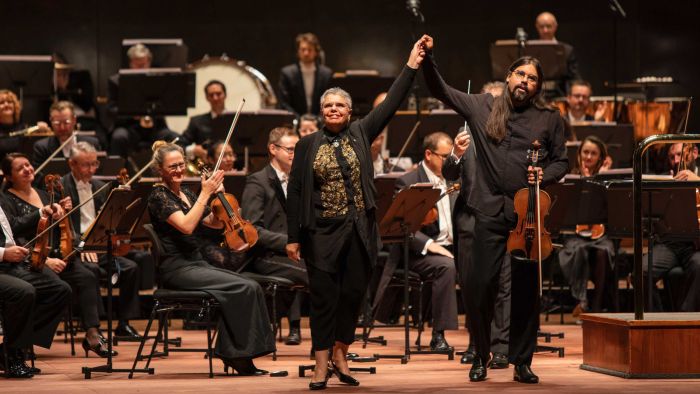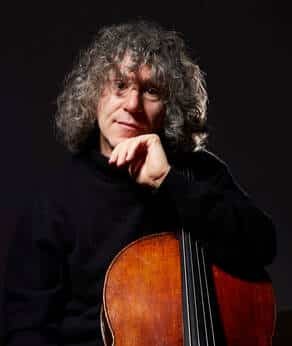Australia sees its first indigenous conductor
NewsWhen Aaron Wyatt conducted the Melbourne Symphony Orchestra at an outdoor concert this week, he broke a long taboo.
Three other indigenous musicians were also called in to play in the orchestra.
Wyatt said: ‘For a very long time I was with the WA Symphony Orchestra as a casual and I was the only Indigenous person there. There’s not a huge number of Indigenous classical musicians. So it’s great to be surrounded by other Indigenous classical musicians in this kind of environment and setting.’
ABC report here.






But the real problem is we aren’t hearing enough from 18th century Aboriginal composers.
How would they didjeridoo that?
Whatever.
Why is it so great, really? Like, why does it matter?
It mattered enough for you to leave a comment! Maybe think before you type?
In the near future, the classical music world will be defined by ethnicity and social justice. New audiences will flock to the concert halls, covid or no covid, and fully enjoy the Great Awokening where age-long injustices will be rectified, and victims compensated, also retroactively. It will be revealed to a previously indifferent world that the art form is relevant after all, and indeed does deserve to be taken seriously, now that its despiccable racism and class suppression and exclusion of the talentless will finally be corrected. The boozjwazee will be dethroned and the unhappy masses will finally be given access to the temples of musical civilisation, their longing finally satisfied and rewarded.
That the music sounds exactly the same as before, is of no importance since nobody will listen to it – audiences will look at the performers and feel their sense of justice be satisfied. What more would we want?
What are rambling on about now, you failed composer? Someone needs to give you your tapioca and put you to bed.
One might infer that (a) you favour excluding people from classical music on grounds of race and class, and (b) you believe people of a different race and class to yourself (white European bourgeois?) must be without talent and unable to appreciate good music.
Did you read beyond the SD headline? Do you know anything about Deborah Cheetham, an indigenous Australian composer?
How sad, that you display your ignorance and prejudice with such pride.
I know, it’s all difficult, isn’t it?
Maybe this helps a bit – it is always worthwhile to think a bit further than the front. And completely free!
The comment was about the general trend, we see now quite often in the classical music world, of treating the performance of music as an expression of problems of injustice that exist in society as a whole. An orchestra, ANY orchestra anywhere, is the result of processes in society, NOT the cause. So, social injustice has to be tackled in society first before the results will become visible (and not audible) in orchestras. To use the orchestra as a shop window of correcting social injustice is placing the problem and its possible solution at the wrong place. Why? Because the problem is the mentality of some type of people, which can only be solved through education and information. And that is a long process, and impossible to solve through quotum regulations and the like. Just turning the orchestra into a showcase of problems that exist in society, is mere theatre and will not solve anything of the real problem.
I disagree almost entirely with this more measured comment. First, nobody (I think) maintains that orchestras are the cause of social injustice, so the rest of your argument falls flat. Second, it is a banal and only partly true that education and information is the solution. Third, if members of a minority that is both historically and at present disadvantaged achieve success, publicizing that success is part of the education and information that will get through to the ‘mentality of some type of people’ — by which I hope you mean that type of people who want to keep such minorities oppressed.
I agree that there can be real problems in a quota-based approach, and these are widely acknowledged and discussed.
But my real objection was that you were triggered by a perfectly innocuous report of some Australian aboriginal people performing in a symphony concert. There was nothing to suggest that they were not there through their own merit and ability — though that was obviously your automatic assumption, which it is hard not to categorize as racist.
Finally, your patronising opening sentences … ugh!
If you knew what I have to endure, this is nothing! And although I’m not an aboriginal, I’m surely original, and if not indigenous, at least ingenious, well, I’m inclined to think so.
Sally
Indigenous is neither positive nor negative.
Absolutely agree with you.
Couldn’t care less.
Indigenous is merely an adjective, not a value.
The pic is confusing, as the indigenous woman pictured in this post is soprano Deborah Cheetham, and Aaron Wyatt is edited out: a very careless thing to do on so many levels, to say the least. Can this please be addressed? Ideally having both indigenous performers as the focus of the picture would be appropriate for their contribution to the concert, one would think.